- Home
- Dennis Lehane
Since We Fell Page 24
Since We Fell Read online
Page 24
“Oh, Rachel,” she heard her mother say, as she’d said more than once, “isn’t it sad that you can only love yourself if someone else gives you permission?”
She looked in the mirror and was shocked to see how much she resembled her, the famous Elizabeth Childs, the woman whose bitterness everyone always mistook for courage.
“Fuck you, Mother.”
She stripped off her bra and underwear and dried herself with a thick towel she found on a shelf. She put her jeans, T-shirt, and windbreaker back on, found a brush and did the best she could with her hair, staring in the mirror again at her mother around the time The Staircase had been published, yes, but also at a new version of Rachel. A killer. She had taken a life. The fact that the life had been her husband’s didn’t make the fact worse or better; the act itself was empirically grave no matter who was killed. She was the agent of removing human life from this planet.
Had he been raising his gun?
She’d thought he had.
But would he have pulled the trigger?
In the moment, she’d been certain he would.
Now? Now she didn’t know. Was the man who’d given his coat to a homeless man on a night of drenching rain capable of murder? The same man who’d psychologically nursed her through three years of illness with nary an impatient word or frustrated glance? Could that man commit homicide?
No, that man couldn’t. But that man was Brian Delacroix, a falsehood.
Brian Alden, on the other hand, could slap an old friend with imperious calm. He could kick his partner and best friend with enough fury to suggest he’d never stop kicking until that friend was dead. Brian Alden had raised that gun toward her. No, he hadn’t pointed it directly at her and no, he hadn’t pulled the trigger.
Because she hadn’t given him the chance.
She went back out on deck. She felt calm. Too calm. And she recognized it for what it was—shock. She could feel herself in her body but not of it.
She found her gun on the deck where he’d dropped it. She tucked it in her waistband at the small of her back. She lifted Brian’s gun off the table. She walked toward Caleb with it and he narrowed his eyes at her, too late to stop her from whatever she planned to do with it.
She flicked her wrist and tossed it past his head into the ocean. She looked down at him.
“Help me wash the blood off the deck.”
24
KESSLER
On the drive back, Caleb had trouble taking clean breaths without pain. They both began to suspect Brian had fractured at least one of his ribs. Once they reached the city proper, Caleb bypassed the first exit for Back Bay. At first she thought he meant to take the next one, but when he passed that too, she said, “What’re you doing?”
“Driving.”
“Where?”
“I have a house that’s safe. We need to go there, figure this out.”
“I need to go to my apartment.”
“No, you don’t.”
“Yeah, I do.”
“There are very pissed-off people who could be after us by now. We have to get out of this city, not into it.”
“I need my laptop.”
“Fuck your laptop. With the money we’ll have you can buy a new one.”
“It’s not the laptop, it’s the book that’s on it.”
“Download another one.”
“Not a book I’m reading, a book I’m writing.”
He looked wildly at her as they passed under a series of bright lamps, his face white, slightly ghoulish, and helpless. “You didn’t back it up?”
“No.”
“Put it in the Cloud?”
“No.”
“Why the fuck not?”
“I need my laptop,” she repeated as the exit approached. “Don’t make me pull the gun again.”
“You don’t need your book with the money you’ll—”
“It’s not about money!”
“Everything’s about money!”
“Take the exit.”
“Fuck!” He screamed it at the ceiling and swerved the car into the exit lane.
They came out of a short tunnel onto the edge of the North End and turned left and headed through Government Center toward Back Bay.
“I didn’t know you were writing a book,” he said at one point. “Is it, like, a mystery? Science fiction?”
“No. It’s nonfiction. It’s about Haiti.”
“That could be a tough sell.” His tone was almost chiding.
She loosed a bitter chuckle. “Check your fucking privilege, my man.”
He shot her an apologetic smile. “I’m just telling you the truth.”
“Your truth,” she said.
Up in the apartment, she went into her bedroom and changed again, back into a dry bra and underwear and swapping out the jeans for black tights, a black T-shirt, and an old gray sweatshirt from her college days at NYU. She opened her laptop and dragged the book files into a folder, something she probably should have been doing all along. She addressed an e-mail to herself and attached the folder and hit send. Voilà. Her novel was now accessible to her no matter what computer she used to access it.
She came out of the bedroom with the laptop under her arm to see Caleb had made himself a drink, as she’d known he would. The kicks to the groin, he said, made sitting uncomfortable, so he stood at the kitchen bar and sipped his bourbon and gave her a thousand-yard stare as she entered the kitchen.
She said, “I thought you were in a rush.”
“We have an hour’s drive ahead.”
“By all means then,” she said, “imbibe.”
“What did you do?” he said with a hoarse whisper. “What did you do?”
“I shot my husband.” She opened the fridge but then couldn’t remember why and closed it. She brought a glass to the bar and helped herself to some of the bourbon.
“In self-defense?”
“You were there,” she said.
“I was on the ground. I’m not even sure I was fully conscious.”
The equivocation irritated her. “So you didn’t see it happen?”
“No.”
No equivocation there. So what would he say from the stand someday? Would he say she acted to save his life and her own? Or would he say he wasn’t “fully conscious”?
Who are you, Caleb? she could have asked. And not in the day-to-day parts of you but in the essential ones?
She drank some bourbon. “He turned his gun toward me and I could see in his face what was going to happen, so I shot first.”
“You’re so calm.”
“I don’t feel calm.”
“You sound robotic.”
“It’s consistent then with how I feel.”
“Your husband’s dead.”
“I know that.”
“Brian.”
“Yes.”
“Dead.”
Now she looked across the bar at him. “I know what I did. I just can’t feel it.”
“Maybe you’re in shock.”
“That’d be my guess.” A horrific realization lurked at the back of her skull, deep in the lizard folds, that for all the grief she could feel swelling in her heart, pushing and scraping at its walls, the rest of her body felt alive in a way it hadn’t since Haiti. The grief would consume her when she stopped moving and stopped focusing on the problems immediately at hand, so the trick for now was to not stop moving and not widen her focus.
“Will you go to the police?”
“They’ll ask why I shot him.”
“Because he was kicking me to death.”
“They’ll ask why he was doing that.”
“And we’ll say he freaked out because you discovered his double life.”
“And they’ll say it wasn’t because you were fucking each other?”
“They won’t go there.”
“It’s the first place they’ll go. Then they’ll want to know what business you were in together and if you had any recent disputes over mo
ney. So whatever you and Brian were into, you better hope none of it gives you motive to kill him. Because then they’ll decide not only were you and I fucking each other, we were fucking over Brian on a business deal. And then they’ll want to know why I threw the gun in the water.”
“Why did you?”
“Because, Jesus Christ, I was fucking confused? In shock? Overwhelmed? I mean, take your pick. And now, once Brian’s death comes to light, I can’t imagine one scenario in which I don’t end up serving some time in prison. Even if it’s just three or four years. And I won’t go to prison.” Now she could feel something, a flutter of fear that bordered on hysteria. “I won’t sit in a box with someone else holding the key. I won’t fucking do it.”
Caleb watched her, his mouth a small oval. “Okay. Okay.”
“I will not.”
Caleb drank a little more bourbon. “We’ve got to go.”
“Where?”
“A safe place. Haya’s already there with the baby.”
She took her laptop and keys off the counter and then stopped. “His body will resurface.” The realization kicked something loose in the center of her. She felt a little less numb suddenly, a little less calm. “It will, won’t it?”
He nodded.
“Then we have to go back.”
“Go back and do what?”
“Weigh the body down.”
“With what?”
“I don’t know. Bricks. A bowling ball.”
“Where are we going to get a bowling ball at”—he looked at the clock on the microwave—“eleven o’clock at night?”
“He has barbells in the bedroom. Two of them.”
He stared at her.
“For curling. You know the little ones. They’re twenty pounds each. Two of those should do the job.”
“We’re talking about weighing down Brian’s corpse.”
“Yes, we are.”
“It’s absurd.”
There was nothing absurd about it. Rationally, she knew exactly what she needed to do. And maybe her shock wasn’t shock at all but was, instead, her brain divesting itself of all unnecessary data in order to process only that which was vital. She’d felt the same way in the squatters camp in Leógâne, moving from tent to tent, tree to tree. Complete clarity of purpose—move and hide, move and hide, move and hide. There were no larger existential questions in play, no shades of gray. Her sense of smell, sight, and hearing were not employed in pursuit of gratification but in pursuit of survival. Her thoughts didn’t wander; they marched in a straight line.
“It’s absurd,” Caleb said again.
“It’s where we find ourselves right now.”
She headed for the bedroom to get the barbells but stopped halfway there when the doorbell rang. It wasn’t the buzzer, which is what normally rang if someone was outside the building. And it wasn’t the intercom on their phone, which is how the doorman announced visitors. No, this was the small doorbell just outside her front door, ten feet away.
She looked through the eyehole and saw a black man with a trim goatee in a brown half-fedora, wearing a leather car coat over a white shirt and black skinny tie. Behind him were two of Boston’s finest in uniform, both women.
She kept the security chain on as she opened the door a crack. “Yes?”
The man held up a gold shield and a Providence Police ID card. His name was Trayvon Kessler. “Detective Kessler, Mrs. Delacroix. Is your husband home?”
“No, he’s not.”
“Do you expect him back tonight?”
She shook her head. “He left today on a business trip.”
“To where?”
“Russia.”
Kessler had a very soft voice. “Would you mind if we came in and chatted for a few minutes?”
If she hesitated, this would turn adversarial, so she opened the door. “Come in.”
He removed his hat as he crossed the threshold and placed it on the seat of the antique chair to his left. His skull was shaven, as she’d somehow known it would be, and gleamed in the dim light of the entryway like polished marble. “This is Officer Mullen,” he said, indicating the blond cop with bright friendly eyes and freckles that matched her hair, “and that’s Officer Garza.” He indicated the dark-haired, heavyset woman with a hungry gaze that was already drinking in the apartment. The gaze fell quickly on Caleb, standing at the kitchen bar with a bottle of bourbon. Rachel noticed she’d left the bottle of wine she’d polished off earlier on the corner of the bar as well, between an empty wineglass and the rocks glass she’d just half filled with bourbon. It looked like they were throwing a party in here.
Caleb came over and shook their hands, introduced himself as Brian’s partner. Then in the silence that followed, with the three cops looking at the apartment with cop’s eyes, Caleb got nervous.
“First name’s Trayvon?” he said to Kessler, and Rachel wanted to shut her eyes in horror.
Kessler took in the bottle of bourbon and the empty wine bottle. “Everyone calls me Tray, though.”
“But like that kid in Florida, right?” Caleb said. “The one who got killed by the neighborhood watch guy?”
Kessler said, “Same first name, yeah. What, you never met no one else named Caleb before?”
“Well, sure.”
“Then . . .” Kessler raised his eyebrows, waited.
“Trayvon’s just a less common name.”
“Where you’re from.”
Rachel couldn’t stand another fucking second of this. “Detective, why are you looking for my husband?”
“We just want to ask him a couple of questions.”
“You’re from Rhode Island?”
“Yes, ma’am. Providence PD. These wonderful officers are serving as my liaisons.”
“What does my husband have to do with something in Providence?” She was pleasantly surprised with how effortlessly she slipped into the role of the befuddled wife.
“You got a mouse under your eye,” Kessler said to Caleb.
“’Scuse me?”
Kessler pointed and now Rachel could see it too, a red welt in the fold of Caleb’s right lower eyelid, growing angrier as they watched. “Look at that, Officer Mullen.”
The blond cop stooped a bit to get a better look. “How’d you happen to come by that, sir?”
“An umbrella,” Caleb said.
“An umbrella?” Officer Garza said. “It jump out and bite you?”
“No, a guy had one on the T when I was coming over here. I work in Cambridge. Anyway, he had it resting on his shoulder and we came to his stop and he turned real quick and it poked me in the eye.”
“Ouch,” Kessler said.
“Exactly.”
“Had to hurt twice as much when you think how little rain there’s been this week. I mean, the beginning of the month, sure, that was crazy. But lately? When’s the last time it rained?” he asked the room.
“Ten days easy,” Officer Mullen said.
“Fuck’s this guy doing carrying an umbrella then?” Again Kessler spoke to no one in particular, a bewildered smile on his lean face. “’Scuse the f-bomb,” he said to Rachel.
“No problem.”
“Crazy world we live in, dudes walking around subway cars with umbrellas when there ain’t no rain.” He looked at the bottles and glasses on the bar again. “So your husband is in Russia?”
“Yes.”
He turned to Caleb, who was clearly hoping he wouldn’t. “And you came by to drop something off?”
“Hmm?” Caleb said. “No.”
“Business papers or something like that?”
“No,” Caleb said.
“So . . . I mean, stop me if I’m being too personal here . . .”
“No, no.”
“But why are you here? Man’s out of the country, and you just drop by to get your drink on with his wife?”
Officer Mullen cocked an eyebrow at that. Officer Garza wandered around the living room.
Rachel said, “We’re
all friends, Detective. My husband, Caleb, and me. Whatever antiquated notions you’re bringing in here about whether a man and a woman can hang out as good friends while her husband is away, I’d really like it if you parked those notions somewhere outside these walls.”
Kessler leaned back a bit, gave her a wide smile. “Well, all right.” The words rode a soft chuckle out of his mouth. “All right. I stand corrected. And I apologize for any offense I may have given.”
She nodded.
He handed her a photograph. One look, and the blood rushed along her hairline and behind her eyes and barreled through her heart. Brian sat with his arm around the pregnant woman she’d seen this afternoon. She wasn’t pregnant in the picture and Brian’s hair had less gray in it than it did now. They were sitting on a couch. It had gray cushions and looked to be made of white rattan that blended with the white beadboard wall behind them. It was the kind of wall you found in a beach house or, at the very least, a house in a beach town. Above them hung a reproduction of Monet’s Water Lilies. Brian appeared very tan. He and the woman sported big white smiles. She wore a blue flower-print summer dress. He wore a red flannel shirt and cargo shorts. Her left hand lay quite casually on his right thigh.
“You don’t look well suddenly, ma’am.”
She said, “How am I supposed to look, Detective, when you hand me a photograph of my husband and another woman?”
He held out his hand. “Can I have it back?”
She handed it to him.
“Do you know her?”
She shook her head.
“Never seen her before?”
“No.”
“How about you?” He handed the photograph to Caleb. “Know this woman?”
“No.”
“No?”
“No,” Caleb said.
“Well, you’ve missed your chance.” Trayvon Kessler returned the photograph to the pocket of his car coat. “She turned up dead about eight hours ago.”
Rachel said, “How?”

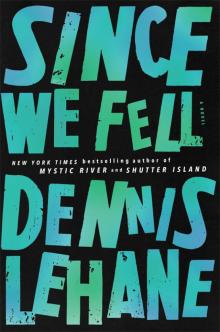 Since We Fell
Since We Fell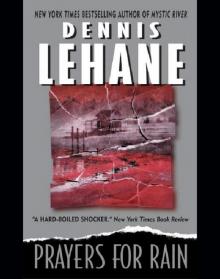 Prayers for Rain
Prayers for Rain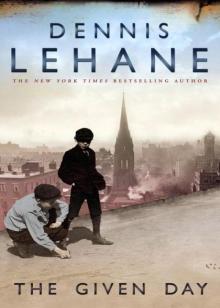 The Given Day
The Given Day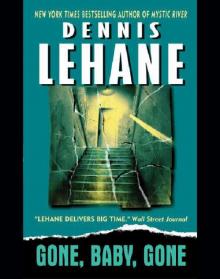 Gone, Baby, Gone
Gone, Baby, Gone Mystic River
Mystic River A Drink Before the War
A Drink Before the War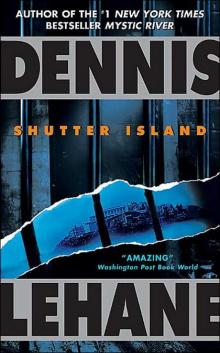 Shutter Island
Shutter Island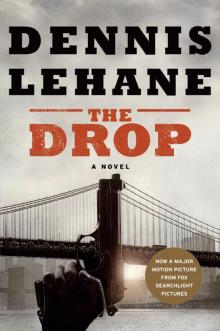 The Drop
The Drop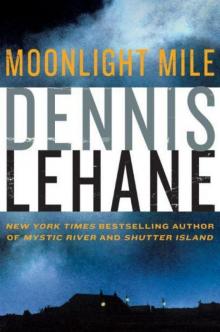 Moonlight Mile
Moonlight Mile Sacred
Sacred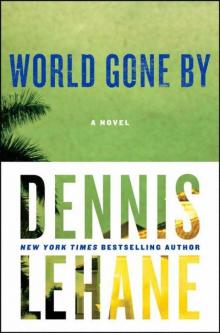 World Gone By
World Gone By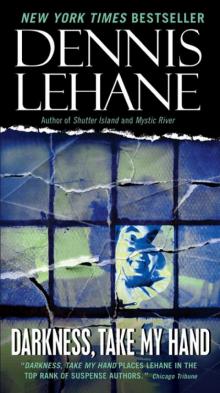 Darkness, Take My Hand
Darkness, Take My Hand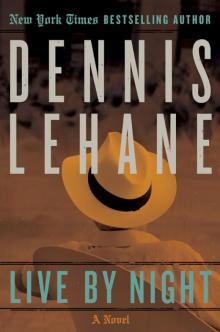 Live by Night
Live by Night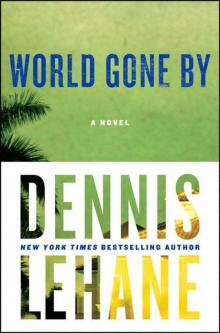 World Gone By: A Novel
World Gone By: A Novel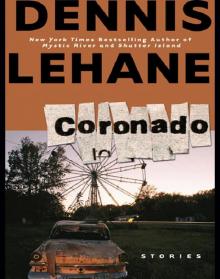 Coronado
Coronado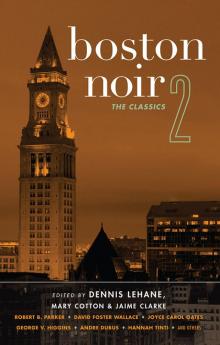 Boston Noir 2
Boston Noir 2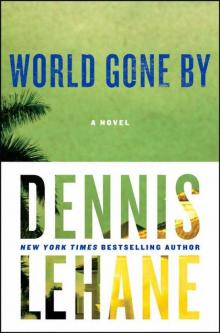 World Gone By: A Novel (Joe Coughlin Series)
World Gone By: A Novel (Joe Coughlin Series)